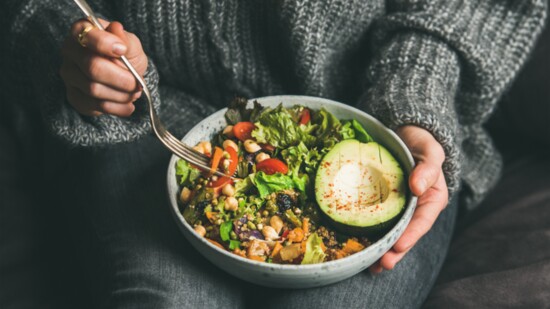It’s that time of year—resolutions season! As we glower at the scale and swear off junk food, it can be tempting to consult the internet for quick fixes. Social media teems with diet fads—short-take TikTok reels and Instagram grids about lettuce water and “oatzempic” and all meat, even an air diet! As ideal as speed-dieting might sound, beware and don’t be influenced. Your life may depend on it.
In the interest of getting solid information from a registered expert, we caught up with Danielle Hernandez, RDN, who’s an outpatient clinical dietitian with Marshall Cardiac & Pulmonary Rehab. She shares what’s true and what’s a myth, and says despite the allure of pretty pictures and wild promises online, “The best nutrition advice is the most boring.”
What are the key principles of a diet that everyone should follow?
A well-balanced diet should include half of your plate being vegetables, one-quarter carbohydrates (pasta, rice, whole wheat products, for example), and one-quarter should be plant (tofu, beans, nuts/seeds) or animal protein.
How do you help clients create healthy eating habits they can sustain?
The most important thing I do as a dietitian is listen to my patients. I let them tell me what their goals are and how they think they can accomplish them. We then work together to create SMART goals (sustainable, measurable, attainable, relevant, time-bound). I provide assistance with things like meal planning, grocery shopping and more.
What are your thoughts on popular diet trends like keto, intermittent fasting or veganism?
Veganism is a way of life, and diet is only one key component of it. Keto, intermittent fasting and others are fad diets, which are not meant to be sustainable. The cycle of these diets is to restrict intake, lose weight and (inevitably) regain the weight. This cycle makes people think they are the problem, when in reality it’s the diet.
Which diet trends do you find potentially harmful or misleading?
One example is the carnivore diet (composed primarily of animal protein). It’s very harmful as it promotes the consumption of meat, especially red meat, while eliminating fiber and other nutrients that are cardioprotective and backed by research.
Detox diets and cleanses are often marketed as quick fixes. Are these approaches truly effective or beneficial?
If anything is promoted as a “quick fix,” it’s usually a way for a company or person to make money off people. These diets and cleanses often lack scientific evidence to support them.
Are there safer, more effective ways to “detox” the body naturally?
Our body has natural detox mechanisms built in. The liver, kidneys, lungs, skin and digestive system work together to remove waste from our bodies. No diet or supplements can improve or replace the functions the body provides.
How do you help clients distinguish between legitimate nutritional advice and fad diets?
If it sounds too good to be true, it mostly likely is. A balanced diet that practices moderation is the best eating plan. No one wants to hear, though, that eating fruits and vegetables is the key to a healthy life.
What red flags should people look out for when evaluating a diet trend?
If a diet has you eliminate food groups like fruits and vegetables, that’s a red flag.
What’s an example of a common nutrition myth you might encounter, and what is the truth behind it?
Myth: Carbohydrates and snacks are bad for you and make you gain weight, especially if you are diabetic.
In reality: Carbohydrates are the body’s preferred energy source. Our body breaks them down to use as energy or stores them to use when we are sleeping, exercising and so forth. There is not one certain food group that contributes to weight gain. People who have diabetes still need carbohydrates. Snacks are a great way to take the edge off hunger and combat overeating at your next meal. Snacks should consist of a protein (peanut butter, hard-boiled egg) paired with carbs (apples, crackers) to slow down the digestion and decrease hyperglycemia (high blood sugar).
How can people protect themselves from misinformation about health and diet?
Check credentials. Registered dietitians (RD or RDN) are the only health care professionals that are legally allowed to give nutrition advice. “Nutritionist” is a nonregulated term and anyone can be a nutritionist, so watch out for that.
Marshall Medical offers the Pritikin Program, a diet and nutrition initiative integrated with their cardiac rehabilitation program. Patients aiming to improve their heart health can attend classes led by Danielle Hernandez, RDN, who teaches heart-healthy eating habits and shares recipes. Visit marshallmedical.org for more information.
Work with a dietician to create SMART goals in dieting: Sustainable, Measurable, Attainable, Relevant, and Time-bound.
If it sounds too good to be true, it mostly likely is. A balanced diet that practices moderation is the best eating plan.
